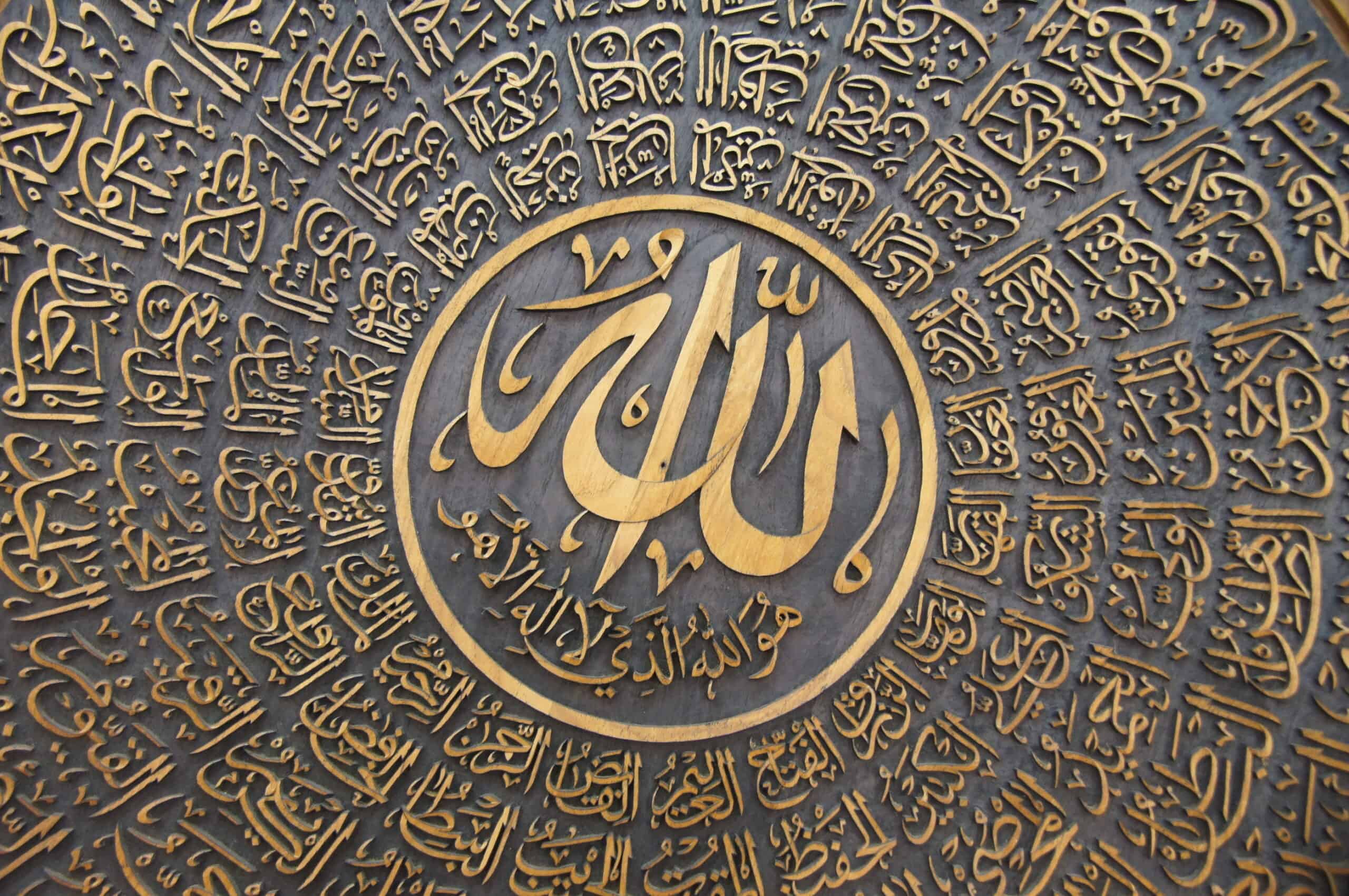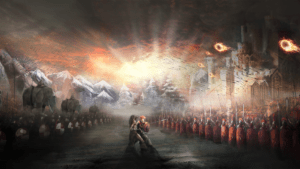Worldview Composition
A comprehensive and well-thought-out worldview must address twelve topics about reality, including:1
1) Theology / Concept of God / Ultimate Reality: What kind of God, if any, actually exists?
2) Metaphysics / External Reality: Is there anything beyond the physical cosmos?
3) Epistemology / Knowledge: What can be known, and how can anyone know it?
4) Ontology / Origins: Where did everything come from?
5) Anthropology / Psychology / Humanity: Who am I? What makes me human?
6) Location: Where am I?
7) Axiology (Morals): How should I live?
8) Axiology (Values): What should I consider of great worth?
9) Predicament: What is humanity’s fundamental problem?
10) Resolution: How can the problem be solved?
11) History (Past & Present): What is the meaning and direction of history?
12) Future / Destiny: Will I survive the death of my body, and if so, in what state?
Outlining the Islāmic Worldview
While brevity precludes a comprehensive articulation of the Islāmic worldview, the following serves as a general framework, describing the basic principles of Islām, without exhaustively developing the particular doctrines. This outline will offer a foundation for future analysis and worldview comparison.
Theology / Concept of God / Ultimate Reality
Tawḥīd—the affirmation that Allāh (the Arabic term for God) is one (Al-ʾAḥad) or singular (Al-Wāḥid)—is a fundamental concept of Islām, rendering it inherently monotheistic (cf. Surah 3:18; 6:102; 7:59; 17:23; 51:56; 112:1). Muslims revere Allāh as the only maximal being (al-Mutakabbir), possessing the attributes of aseity (al-`Aziz; al-Qayyūm; al-Awwal; al-Ākhir), eternality (al-Bāqī), infinity (al-‘Azīm), omnipotence (al-Jabbār; al-Qādir), immutability (al-Bāqī), omniscience (al-‘Alīm; ar-Rashīd), holiness (al-Quddūs), righteousness (al-Barr), goodness (ar-Rahmān; ar-Rahīm), and truth (al-Haqq). Of these, Islām emphasizes the divine attributes of oneness, transcendence, and sovereignty.
Muslims recognize Islām as the purest form of monotheism, and identifying Allāh with any finite creature is širk—the worst offense in Islām—the sin of idolatry (i.e., to affirm or practice polytheism). Islām asserts the other monotheistic religions (Judaism and Christianity) are hopelessly corrupted (cf. Surah 5:13-14; 3:78; 7:162; 4:46), and Muslims vehemently condemn the Christian doctrine of the Trinity as heretical—understanding it to be polytheistic (cf. Surah 4:171; 6:102; 9:30-31; 31:13). This explains why the Jesus of the Qurʾān adamantly denies any notion that he is divine (cf. Surah 5:116-118).2
Metaphysics / External Reality / Ontology
Allāh created the heavens and the earth (cf. Surah 2:29; 3:47, 59; 25:59; 32:4; 71:15-19; 20:6), and remains distinct from his creation. All creatures are responsible to Allāh, and although the universe exists as a closed system, nothing occurs apart from Allāh’s divine decree (cf. Surah 3:47; 6:59b; 57:22-23). While all forms of theism (e.g., Christianity, Judaism, and Islām) portray God as transcendent and immanent, Islām places great emphasis on Allāh’s transcendence.
Epistemology / Knowledge
Objective truth exists, and authentic knowledge of Allāh, self, and creation are available through general and special revelation. Allāh has designed humanity so that their senses and reasoning capabilities are (generally) a reliable means of acquiring knowledge. However, it appears that despite the existence of moral agency, human actions are bracketed by Allāh sovereign decrees. As a result, mankind’s ability to acquire knowledge is limited, and a doctrine of predestination appears to emerge within the teachings of the Qurʾān (cf. Surah 6:111, 125; 2:155-157).3
Anthropology / Psychology / Humanity
Endowing humans with special abilities, Allāh recognizes mankind as the pinnacle of his creation, exalting them over all other creatures (i.e. angels and jinn). In Surah 2:30-34 we see the angels objecting to the creation of humanity, and once Allāh creates Adam, the angels are commanded to bow in reverence to him.4 Although Adam and Eve would eventually disobey Allāh, they would be forgiven and would not incur any lasting guilt. Accordingly, mankind never became beset with a hereditary sin nature.
Humans have both physical and immaterial aspects (i.e., body and soul). They are intelligent creatures, with an innate sense of morality (fiṭrah), and they possess free will (cf. Surah 33:72). However, not all human beings are equal in worth. Surah 98:6 says, “Indeed, they who disbelieved among the People of the Scripture [i.e., Jews and Christians] and the polytheists will be in the fire of Hell, abiding eternally therein. Those are the worst of creatures.”5 This concept explains why the Qurʾān instructs Muslims to be merciful to fellow believers, but forceful against non-Muslims (cf. Surah 48:29). The prophet Muhammad also declares females inferior to men, stating that a woman’s testimony is only worth half that of a man, due to her mental deficiencies (cf. Abu Sa`id Al-Khudri 2658; also, Surah 2:282).
Axiology / Ethics / Morality
Absolute or objective moral laws and duties exist. Islām holds to a command theory of ethics, in which Allāh institutes morality by divine directives which are epistemically obtainable through diligent study of the Qurʾān, ʼaḥādīth, and Sharīʿah.6 While, moral obligations begin with the five pillars of Islām, three fundamental categories of actions regulate the Muslim life—directly commanded or morally required actions (farīḍah), permitted activities (ḥalāl), and prohibited acts (ḥarām).7 Questioning Allāh’s commands equates to disobedience, and faithful Muslims are those who accept the teachings of the Qurʾān without question (bi-lā kayf).
Predicament and Resolution
Islām is not a redemptive religion since Allāh created virtuous human beings. Unfortunately, Allāh also created humans as limited, weak creatures, with free will—thereby giving them the capacity to disobey him. Humans are routinely deceived by jinn and have subsequently forgotten the true revelations of Allāh (cf. Surah 15:34-40; 7:16-17; 6:112-113). Every human is to believe the teachings of Muhammad, obey the commands of the Qurʾān, and practice the five pillars of Islām in hopes of being found worthy of paradise. Islām recognizes the presence of suffering in the world is either (1) punishment for rebellion against Allāh or (2) a divine test of an individual’s faith; therefore, Allāh is the source of suffering (cf. Surah 4:78; 15:60; 64:11; Sunan Abi Dawud, Book 42, Hadith 100; Riyad as-Salihin, Book 1, Hadith 60).
Destiny
After death, a person’s soul remains in the state of Barzakh (an intermediate location/state of being) until the Day of Judgment (Yawm al-Qiyāmah).8 Burial rituals are significant in Islām, as the observance (or omission) of proper burial customs contributes to the fate of the soul after death. According to Islāmic tradition, the deceased will undergo interrogation by two angels (Munkar and Nakir) to test the sincerity of his faith.9 Thus, survivors will often attempt to prepare their loved one to answer these questions properly before their death.
At the Day of Judgment, both the living and the dead will present themselves before Allāh, who will confront each person with the deeds he conducted during his lifetime. Sincere submission to Allāh’s commands serves as the basis for judgment. Faithful Muslims enter paradise (Jannah), while the unfaithful (i.e., idolaters) receive physical punishment in hell (Jahannam).10 Other than dying as a martyr, Muslims have no guarantee of going to heaven.11
Author Suzanne Haneef (an American-Muslim) does an excellent job of explaining the uncertainty of a Muslim’s eternal destiny. She writes,
No Muslim, even the best among them, imagines that he is guaranteed paradise; on the contrary, the more conscientious and God-fearing one is, the more he is aware of his own shortcomings and weaknesses. Therefore, the Muslim, knowing that God alone controls life and death, and that death may come to him at any time, tries to send on ahead for his future existence such deeds as will merit the pleasure, of his Lord, so that he can look forward to it with hope for his mercy and grace.12
History (Past, Present, and Future)
History progresses in a linear direction and events unfold according to Allāh’s sovereign will. History is both real and significant, as it demonstrates the sovereignty of Allāh and provides humans with the opportunity to demonstrate faithful submission to him. The goal of creation (in the present) is for humanity to unite under the Ummah (a global Islāmic theocracy). Scholars debate Islāmic eschatology, and it is unclear how future events are to unfold.13 In any case, the Qurʾān is clear about the last judgment that will take place (cf. 20:102-127; 18:101-104; 23:105-115).
- Kenneth Richard Samples, A World of Difference: Putting Christian Truth-Claims to the Worldview Test (Michigan: Baker Books, 2007), 21-28.
- According to Islām, ʿĪsā (Jesus) was a great prophet of Allāh (cf. Surah 4:171; 5:46; 5:75; 19:30; 33:7; 57:27)—He was born of a virgin (cf. Surah 19:19-21; 21:91) and conducted miracles (cf. Surah 2:87; 2:253; 43:63) to authenticate his message. However, he was a created being (cf. Surah 3:59; 19:34-45), who was nothing more than a servant of Allāh (cf. Surah 43:57-59). He did not teach people to worship him (cf. Surah 5:116), nor was he crucified (cf. Surah 4:157). Rather, he was taken bodily into heaven (cf. Surah 3:55), and anyone professing Jesus’ divinity is guilty of širk and is cursed (cf. Surah 9:30).
- Determinism is often rejected by Islāmic scholars, who appear to favor a compatibilist theory of human freedom, yet throughout history, much debate has arisen over the freedom-predestination issue.
- Also see Surah 15:28-43.
- All Qurʾān references are from the Sahih International Translation, unless otherwise noted. [Emphasis added]
- The Qurʾān is believed to be the very words of Allāh; therefore, the Qurʾān takes precedence for understanding objective morality. However, the Qurʾān proclaims Muhammad is the prime example of a faithful Muslim (cf. Surah 33:21). Accordingly, the Qurʾān continually exhorts Muslims to obey Muhammad—while condemning those who are disobedient—thus placing a huge emphasis upon the life and teachings of Muhammad (as recorded in the ʾaḥādīth) as the divine revelation of an objective moral standard. The Sharīʿah represents the practical application of teachings from the Qurʾān and ʾaḥādīth—as interpreted and applied by Muslim scholars and religious leaders—and remains the least authoritative of the three.
- The five pillars of Islām are, (1) the testimony or confession of faith (aš-šahādah), (2) daily ritual prayers (ṣalāt), (3) fasting (ṣawmā), (4) alms-giving or charity (zakat), and (5) pilgrimage to Mecca (Ḥaǧǧ). The šahādah (in English) states, “There is no God but God, and Muhammad is the apostle of God.” This simple confession is the first step in conversion to Islām. Intellectual assent does not appear to be a requirement, rather one must simply recite the šahādah and submit to Islāmic teachings.
- Cf. Surah 23:99-100. Again, there is much debate among religious leaders about what this intermediate state consists of.
- Jami` at-Tirmidhi, Vol. 2, Book 8, Hadith 1071.
- Cf. Surah 3:85; 56:1-56; also, Ṣaḥīḥ al-Bukhārī Vol. 1, Book 2, Hadith 42.
- Cf. Surah 3:169-170; 9:111; 22:58; also, Sahih Muslim Vol. 5, Book 20, Hadith 4696; Ṣaḥīḥ al-Bukhārī Vol. 4, Book 52, Hadith 54; Ṣaḥīḥ al-Bukhārī Vol. 4, Book 52, Hadith 72; Ṣaḥīḥ al-Bukhārī Vol. 5, Book 59, Hadith 318; Ṣaḥīḥ al-Bukhārī Vol. 4, Book 52, Hadith 49. Many Muslims also believe that children who die before the age of accountability (typically considered the age of puberty) also go to Jannah.
- Suzanne Haneef, What Everyone Should Know About Islām and Muslims (Chicago, IL: Kazi Publications, 1979), 37.
- A number of conflicting traditions detail the events prior to the final judgment. Many Muslims believe in the second coming of Jesus, believing that he will descend upon the Mosque of the Umayyads (commonly called the Great Mosque of Damascus) in Syria. Numerous Muslims believe the Mahdi will appear just prior to the final judgment, yet controversy arises over the proclamation that Jesus is this figure. While Muslims remain divided on the specifics, the details are not crucial since the final judgment immediately follows.




